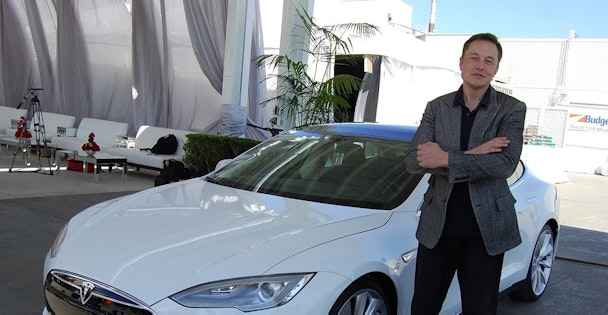Time is up on Tesla’s anti-advertising strategy
Tesla has a proud anti-advertising strategy and been built instead on its founder’s fame. But with Elon Musk’s Twitter takeover at risk of alienating its core (left-leaning) customer base, Daniel Binns, chief executive officer at Interbrand New York, argues that it’s time Tesla bosses started properly managing the brand.

Elon Musk, Tesla founder and soon-to-be owner of Twitter
Many technology companies have built their brands around the cult of personality that emanates from their leader. Where would the Apple brand have been without Steve Jobs, or Microsoft without Bill Gates? But equally many have seen their brand get tarnished through the behaviors of their founders – I’m sure the shareholders of Uber and WeWorks don’t thank Travis Kallanick and Adam Neumann for their personal and professional indiscretions that had such massive impact on the companies they founded.
So where on this spectrum lies Elon Musk and the Tesla brand? Undoubtedly Musk’s drive for ground-breaking innovation, maniacal attention to detail and flair for provocative marketing stunts (Space Oddity playing on loop on the stereo of the Tesla roadster released into space from the first Space X launch, or the S 3 X Y names of the first four Tesla models, for example) are intrinsically part of the Tesla brand. Its stupendous growth on our Best Global Brands ranking (+158% last year alone) demonstrates how successful it has been in leveraging its founder as an asset, given it has spent almost nothing on marketing since the company was founded in 2003.
But Musk has not been without controversy – his Tweets on Tesla’s stock performance landed him in hot water with the SEC, and his false claims about Covid have been extremely divisive. To date none of that has affected the Tesla brand – perhaps just added to the allure of the mad, slightly unpredictable, genius inventor at the helm.
But these were peripheral, a side show to the incredible success of Tesla, its legions of rabid fans and its technology that reframed the entire car industry. With his acquisition of Twitter, the stakes are far higher and the visibility of his decisions far greater. He risks alienating the heart of his consumer base, who are largely left-leaning progressives who care passionately about the environment and whose choice of vehicle speaks to these values.
If he were to take the reins off Twitter and allow a far more libertarian perspective to emerge, with freedom of speech the underlying tenant, this will not sit well with many in this audience. If this resulted in the return of Donald Trump to the platform this would be the proverbial cherry on the cake, and it would be hard for Musk not to be directly associated with that decision. Given how polarizing a character the former president is, it would have a significant impact on Musk – and by association the Tesla brand.
I believe there would be some immediate backlash were this to happen. A vocal minority may call for a boycotting of Tesla, but that would soon diminish. What I fear would happen is a slower corrosion of the passion the Teslarati have toward the brand. A shift from Tesla as a powerful badge of defiance against the traditional ICE automotive brands and a statement of believing in a better way by its owner – from an emotive brand with deep empathetic values – to that of simply a terrific car.
With the EV wars revving up, Tesla can ill afford to lose the brand love it has amassed. Where once it was a pioneer leading the charge on the EV revolution, it now sits on a healthy but not dominant 14% of the global EV market, having shipped just under a million cars in 2021. VW is close behind with a 12% share, and climbing fast.
What should Tesla be doing to protect its brand essence and withstand the potential tsunami of bad blood that might come from the Twitter fallout? If we look at Interbrand’s Best Global Brands analysis and which of the 10 areas of Brand Strength Tesla needs to be concerned about, it comes down to Empathy, Participation and Affinity. What do I mean by that?
Empathy is the extent to which a brand understands and reflects the needs of its customers. This will come into question if Musk is making decisions that go against the core values of his customer base. Participation is the degree to which people want to engage with the brand beyond using and transacting with it. Will people be such passionate advocates for the brand and want to connect with it more deeply if it has a slight tinge of shame associated with it? And will these lead to a lack of Affinity, the emotional resonance that has been at the heart of Tesla?
To mitigate this, I would argue now is the time to actively manage the Tesla brand. It has allowed the brand to bask in the fumes emitted from the Tesla products, services, the overall experience and the actions of its founder. A small b brand in a big B world. That may have to change, and it should now think about creating and managing the brand outside of Musk, spending on marketing more overtly to shape perceptions and opinions of current and future buyers, to bottle and codify the essence of why people love Tesla, and communicate that more effectively to the market.
Amazon had a similar about-turn when its brand started to have negative associations. Simply offering an amazing product and experience was not enough, it realized, and quietly it has become the largest advertiser in the world. It’s now Tesla’s turn to consider that leap.
